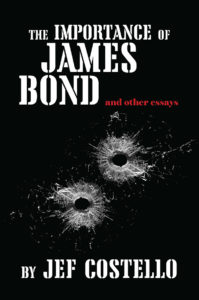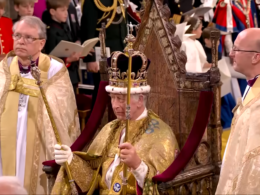The Mystery of Constitutional Monarchy
Let’s just get it out of the way right now: There were too many multi-culti annoyances at the coronation of King Charles III. For me the worst part was this — but it’s not even that bad. Not nearly as bad as the black preacher at Harry’s wedding. (If you click the link and watch the black preacher, note the priceless reactions from Prince Andrew’s daughters, Beatrice and Eugenie.) But there was so much else about the coronation that was exquisitely beautiful and moving, I was willing to overlook all of that.
Purely on the level of spectacle, it is unsurpassed by any event in recent memory save one: the funeral of Queen Elizabeth II. You’ve really got to hand it to the British, don’t you? This is a people who, at this point, have practically had their balls cut off and handed to them in a purse with a matching pair of heels. But there’s still something left in them after all; something of the old imperial sangfroid, panache, and savoir faire are still very much in evidence. (Thank God for the Norman Conquest, or we wouldn’t be able to describe anything!) And a reverence for tradition was also in evidence — no matter how compromised by an obsession with seeming au courant.
That most of my closest friends didn’t plan to watch the coronation and have a “ho hum” attitude about the whole thing is inexplicable to me. This was our chance to witness, possibly for the one time in our lives, an ancient ceremony rich with symbolism. For some time now, Greg Johnson has referred to me as Counter-Currents’ “royal correspondent” (my first such contribution is here — and see here and here — oh, and also here). The source of my interest is simple: I never cease to be fascinated by the fact that these traditions survive and are being perpetuated by people who seem to really believe in them — no matter how disappointingly “modern” those people may seem in other respects.
Each element of the coronation — every garment worn, every object, every decoration, every color, every gesture, every choice of doors to enter and exit from, every line read or recited, every piece of music (save, perhaps, the one linked above) — tells a story. Everything is rich with history and significance. And, unless they were putting on a very good act, every participant seemed, with their every gesture and expression, to communicate that they were aware of all these meanings and that they believed. It was the most sincere hour I’ve seen on television in a long time. No irony here, no glad-handing American insincerity; no high-fiving; no Elton John; and, most importantly, no Meaghan.
This was a moment to face ourselves and see just how silly and vulgar we are. This was a moment to be humbled. This is one of the most important functions of tradition, and of the representatives of tradition, such as the royals: to remind us of greatness, of something greater than ourselves, so that we feel a call to rise, to be better than we are, to be worthy of our history, and to make our ancestors feel a little less nauseated when they look down at us, from wherever they are. It was the most beautiful ceremony I think I have ever witnessed (again, rivalled only by the Queen’s funeral) — and, to my surprise, it was also quite emotionally moving.
This had to do almost entirely with King Charles himself. I studied his facial expressions carefully throughout the ceremony — as I am sure every viewer did. At 74, Charles is the oldest person ever to be crowned King of England. The coronation is the moment he had been preparing for his entire life. What is extraordinary is that he seemed genuinely humbled by the experience. He listened intently to everything that was said, and his eyes conveyed sincerity of belief. At times, he seemed emotionally moved — almost on the verge of tears. For many men, this would be the ultimate self-aggrandizing experience, but not for Charles. He seemed to feel the weight of history, and the burden of his high office.
At no point was this more palpable than when he was invested with all the paraphernalia of the monarch. Each object was carefully presented to him and explained. At some moments, he made eye contact with the individuals presenting the different ceremonial objects, and smiled at them benevolently. The objects that were not presented to him to wear and carry (such as the Great Golden Spurs), he caressed, as if he were touching holy relics loaded with mana. Each time he was invested with one of the objects he was meant to actually wear or carry — the coronation robes, the golden orb, the scepters, and, finally, the crown — his expression seemed to suggest that he received each as a burden, rather than as a treasure or a symbol of personal importance.

You can buy Jef Costello’s The Importance of James Bond here
Of course, part of the reason for this is that these objects really are quite literally a burden: They are extremely heavy — so heavy that Charles had to be helped to stand up and sit down, and to walk. It was impossible for me not to feel sympathy for this old man, weighed down by these great burdens, received so late in life. Watch the video and you will see what I saw: Charles suffered. Yet these burdens were received at the right time: Charles certainly had time aplenty to reflect on the meaning of it all, and to avoid the mistake a younger man might make: thinking that all this was for him.
In fact, thousands filled the streets and £100 million ($125 million) was spent — not for Charles Philip Arthur George, but for what he represents. The ceremony is, in part, designed to effect this realization — in the onlookers, and also in the monarch himself. In the Coronation Chair, we are meant to realize, sits not a man, but Britain itself. I believe that even the weight of the ceremonial objects — the robes, crown, etc. — is intended to convey this to their bearer. Don’t rejoice, don’t imagine that this is a celebration of yourself, that weight seems to say. This is a cross to bear, not a gift. No one cares about you; all that matters is what you represent.
In all this, there is a deep mystery. I think that some of my friends take no interest in these matters because they have formed the tacit conviction that Charles, and other modern monarchs, are not “real” kings. What’s a real king? Someone with political power; someone who could launch an armada or convey his enemies to the Tower. Charles, by contrast, is sort of a pretend king, a mere “figurehead.” But this just misses what is so special and, I would say, genuinely mysterious about constitutional monarchy.
It’s true that Charles wields no real political power. (Constitutionally, the monarch does have certain significant powers — such as to declare war, to make peace, to fire ministers, and to command the military — but these powers have not been exercised in a very long time.) Yet, he wields a very different sort of power: the power of symbolism. Symbolic power is of extraordinary significance. But literal-minded sorts, the people who think power is exclusively about guns and money, seem to be oblivious to it. In truth, the constitutional monarch is something much more interesting than the absolute monarch. His power consists in the fact that he is the nation embodied in one man.
Because the monarch is above politics — never expressing political opinions — he can embody the nation for those of different political persuasions. Paradoxically, it is because he is powerless that the monarch is so powerful. His power is close to the virile power that Julius Evola speaks of: a power that comes not from doing anything, not from being a man of action, but merely from being; being who he is. Being born to reign, born to embody the nation, born to represent history and tradition.
This would be absolutely impossible if the King were chosen by the people. And this is why American presidents can’t ever manage to be the “father of the country”: If you didn’t vote for him, he’s not your national symbol. The American coupling of the roles of head of government and head of state is disastrously wrongheaded, and this fact alone demonstrates the superiority of constitutional monarchy. The monarch is not chosen by the people, he is “chosen by God,” as we were reminded on Saturday. He is the next in line in a line of kings that goes back centuries. He can embody the nation because his family history is essentially the same thing as the nation’s history.
For years prior to his mother’s death, the world debated whether Charles was “fit” to be King (many said he was not), and whether the public would accept him. This all faded away to nothing as soon as the Queen died. The enormous outpouring of grief that we saw last September translated into enormous sympathy directed toward Charles — for the loss of his mother, and for the enormous burden suddenly thrust upon him, at his advanced age. There was also a willingness to “give him a chance,” and a feeling that to do otherwise would be unfair. So far, this good will on the part of the public has held up. And it is not hard to see why. Aside from a few very, very minor displays of temper (which are more amusing than anything else), Charles has been just as his mother was: self-effacing.
And this is another of the mysteries of constitutional monarchy. I realized this as I watched Charles during the coronation: for him, this is a way. It is a kind of karmayoga: the obliteration of the ordinary ego through the path of duty, of unselfish action. This way is extraordinary, because no one can choose it: one has to be born into it. The gods have made other paths available to the rest of us, but to this one man they gave a path that no one else may walk.
Of course, not all monarchs have been up to it. Most have only appeared to be self-effacing — though in appearing to be so, they did their duty to the nation, and that was enough. But Charles, whatever his flaws, is reportedly a religious man who also cherishes his family history. The meaning of the coronation would have been lost on lesser men with more ordinary dispositions — but not, I think, on Charles.
One man is King. One man effaces himself and becomes the nation and its history — or, at least, he appears to. And the nation sees itself in him and, effectively, worships itself in him. The people loved the Queen, and they will love King Charles as well. This always happens. It happens because, deep down, no matter what they may say, they love themselves — their people, their culture, their history. The ups and downs of the royal family — who are more like a pantheon of (highly imperfect) gods than anything else — become the ups and downs of the nation. When the monarch rejoices, when he is crowned or celebrates a milestone, the people rejoice. When he dies, they grieve. This is the mystery of constitutional monarchy.
Of course, the question is how much longer it can last. As I noted at the outset, strenuous efforts are being made to assure everyone that Charles is not just King of the British but also of those folks who merely happen to carry British passports. It seems doubtful that this is going to work — no matter how many non-whites get recruited for the pomp and circumstance, and no matter how many are elevated to the peerage.
The monarch, I’ve said, embodies the nation. But who is that? I suspect he performs this function almost entirely for the real Brits, and not for folks like Ngozi Fulani. The trouble is, of course, the real Brits just aren’t having babies. Many years ago, the Shah of Iran quipped that “one day there will be only five kings in the world: the four in the deck of cards, and the one in England.” But I don’t know. All things come to an end. I don’t think that I will live to see the end of the British monarchy, and I’m happy about that. It would be like living to see a black James Bond.
So, stop your carping and enjoy what’s left of it while you can. And rejoice — for something genuinely magical happened last Saturday. We don’t get to see that very often.
* * *
Counter-Currents has extended special privileges to those who donate $120 or more per year.
- First, donor comments will appear immediately instead of waiting in a moderation queue. (People who abuse this privilege will lose it.)
- Second, donors will have immediate access to all Counter-Currents posts. Non-donors will find that one post a day, five posts a week will be behind a “Paywall” and will be available to the general public after 30 days.
- Third, Paywall members have the ability to edit their comments.
- Fourth, Paywall members can “commission” a yearly article from Counter-Currents. Just send a question that you’d like to have discussed to [email protected]. (Obviously, the topics must be suitable to Counter-Currents and its broader project, as well as the interests and expertise of our writers.)
To get full access to all content behind the paywall, sign up here:
Paywall Gift Subscriptions
 If you are already behind the paywall and want to share the benefits, Counter-Currents also offers paywall gift subscriptions. We need just five things from you:
If you are already behind the paywall and want to share the benefits, Counter-Currents also offers paywall gift subscriptions. We need just five things from you:
- your payment
- the recipient’s name
- the recipient’s email address
- your name
- your email address
To register, just fill out this form and we will walk you through the payment and registration process. There are a number of different payment options.



